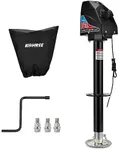We Use CookiesWe use cookies to enhance the security, performance,
functionality and for analytical and promotional activities. By continuing to browse this site you
are agreeing to our privacy policy
Best Electric Trailer Jacks
From leading brands and best sellers available on the web.#2

Kohree
Kohree Electric Trailer Jack 3700lbs, Heavy Duty RV Electric Power Tongue Jack Max 4000lbs for Travel Trailer A-Frame Camper, with Drop Leg & Weatherproof Jack Cover, 22" Lift, 12V DC Black
View Product
#3

Lippert Components
Lippert 285318: Electric Tongue Jack (Black) 3500#
View Product
#4

PEAKTOW
PEAKTOW PTJ0233 Heavy Duty Electric Power A-Frame Tongue Jack for Trailer and Camper, 3500lbs
View Product
#5

Bulldog
Bulldog 500187 Black A-Frame Jack with Powered Drive
View Product
#6

Bulldog
Reese 500199 A-Frame Power Jack 4000# Black
View Product
#7

Husky
Husky 82084 Super Brute Electric Jack - 4000 lb. Capacity
View Product
#8

RAM
RAM EJ-3520-BBX 3,500 lb. Electric Trailer Jack with Drop Leg
View Product
#9

Husky
Husky HB4500 4500 lbs. Brute Power Jack, Hammer Gray Finish
View Product
#10

HUSKY TOWING
Husky 87641 Brute Electric Jack with Wireless Remote - 4500 lbs. Capacity
View Product
Buying Guide for the Best Electric Trailer Jacks
Choosing the right electric trailer jack can make hitching and unhitching your trailer much easier and less physically demanding. The right jack will save you time and effort, and ensure your trailer is stable and secure when parked. To find the best fit, it's important to understand the main features and specifications that affect performance and compatibility with your trailer. By focusing on your trailer's size, how often you use it, and the conditions you'll be operating in, you can narrow down your options and select a jack that meets your needs.Lifting CapacityLifting capacity refers to the maximum weight the electric trailer jack can safely raise and support. This is crucial because using a jack with too low a capacity can be dangerous and may damage both the jack and your trailer. Lifting capacities are usually divided into light-duty (up to 2,000 lbs), medium-duty (2,000–3,500 lbs), and heavy-duty (over 3,500 lbs). To pick the right one, check your trailer's tongue weight (not the total trailer weight) and choose a jack with a capacity that exceeds this number for safety and reliability.
Lift HeightLift height is the range of vertical movement the jack provides, from its lowest to its highest point. This determines how easily you can hitch and unhitch your trailer from different vehicles or uneven ground. Lift heights typically range from about 14 to 24 inches. If your trailer sits high or you often park on uneven surfaces, a jack with a greater lift height will be more versatile. Consider your typical towing vehicle and parking situations to decide how much lift you need.
Power SourceElectric trailer jacks are powered either by your trailer's onboard battery or by connecting to your tow vehicle's electrical system. Some models also offer manual backup cranks. The power source affects convenience and reliability. If you frequently camp off-grid or don't always have access to a charged battery, a model with a manual backup is a smart choice. Think about your usual setup and how you'll power the jack to ensure it fits your routine.
Mounting StyleMounting style refers to how the jack attaches to your trailer, with the most common types being A-frame and straight-tongue mounts. It's important because the jack must be compatible with your trailer's frame. A-frame jacks fit trailers with a triangular tongue, while straight-tongue jacks are for trailers with a straight, rectangular tongue. Check your trailer's design before shopping to ensure you select a jack that will fit securely.
Weather ResistanceWeather resistance describes how well the jack can withstand exposure to rain, dust, and other outdoor elements. Features like powder-coated finishes, sealed switches, and waterproof motor housings help prevent rust and electrical issues. If you store your trailer outdoors or use it in harsh weather, prioritize a jack with strong weatherproofing to ensure long-term durability and reliable operation.
Ease of Use FeaturesEase of use features include things like built-in LED lights, remote controls, and simple control switches. These features make operating the jack more convenient, especially in low light or tight spaces. If you often hitch up at night or want extra comfort, look for models with these user-friendly additions. Consider your typical usage scenarios to decide which features will make your experience smoother.





